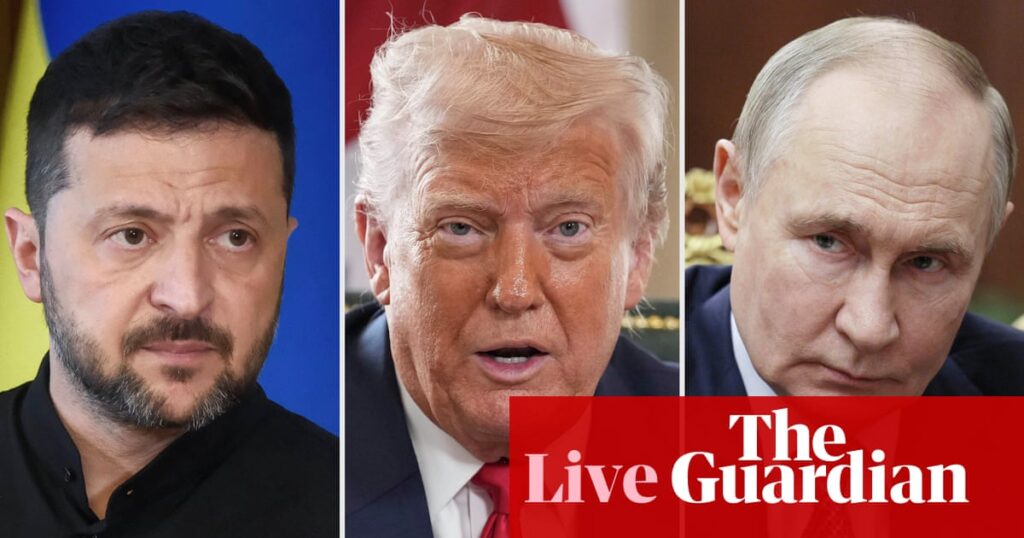European leaders set to join call with Zelenskyy, Trump on Wednesday
Looks like a phone call between European leaders, Ukraine’s Zelenskyy and Trump is already in the calendars, as the parties are keen to coordinate before Trump’s meeting with Putin on Friday.
Germany said in the last few minutes that chancellor Friedrich Merz will host “virtual talks” between EU leaders – the leaders of the six nations that signed the joint statement over the weekend, so Finland, France, Germany, Italy, Poland, the UK (9:57) – who will be joined by the EU’s presidents von der Leyen and Costa and Nato’s secretary general Mark Rutte to speak with Zelenskyy, before joining a separate call with Trump and his vice-president, JD Vance.
A statement by Merz’s office said the talks will focus on “further options for exerting pressure on Russia” and “the preparation of possible peace negotiations,” including “related issues of territorial claims and security.”
The news of the call was first reported by the German press, including Welt and Süddeutsche Zeitung, and Politico.
Key events
-
European leaders set to join call with Zelenskyy, Trump on Wednesday
-
EU leaders push to consult with Trump ahead of Putin meeting on Ukraine
-
Temperatures up to 44 Celsius expected on Tuesday, Spain’s meteorological office says
-
Putin should never be trusted, Starmer’s spokesperson says
-
Albania battles wildfires amid extreme temperatures
-
Heatwave expected to move to central, eastern Europe next – analysis
-
Southern Europe swelters under deadly heatwave as temperatures pass 40C
-
Extreme heat across south-western Europe
-
Israeli plans for Gaza ‘a disaster waiting to happen,’ Macron says
-
Finland brings charges against Eagle S captain, officers over cable cuts in 2024
-
Concessions won’t persuade Russia to stop killing, Zelenskyy says, as he calls for more pressure on Moscow
-
France faces ‘high risk day’ with temperatures set to exceed 40 Celsius
-
Over 100 former MEPs urge EU to suspend its association agreement with Israel
-
US pledged to consult European partners before meeting Putin, Poland’s Tusk says
-
Kyiv must be involved in Ukraine peace talks, Poland’s Tusk says, as he warns against allowing Russia to challenge borders ‘with impunity’
-
Alaska good fit for Trump-Putin meeting as place of mutual inconvenience – analysis
-
Confusion over the Alaska summit shows Putin still calls the shots – analysis
-
Morning opening: Nothing about Ukraine without Ukraine
When it comes to timing of the Europe-Trump call, we’re expecting the internal European call at midday GMT (so 1pm BST, 2pm CEST), followed an hour later by a separate call with Trump and Vance.
The so-called coalition of the willing is then expected to have another call later in the afternoon to consult on the next steps.
European leaders set to join call with Zelenskyy, Trump on Wednesday
Looks like a phone call between European leaders, Ukraine’s Zelenskyy and Trump is already in the calendars, as the parties are keen to coordinate before Trump’s meeting with Putin on Friday.
Germany said in the last few minutes that chancellor Friedrich Merz will host “virtual talks” between EU leaders – the leaders of the six nations that signed the joint statement over the weekend, so Finland, France, Germany, Italy, Poland, the UK (9:57) – who will be joined by the EU’s presidents von der Leyen and Costa and Nato’s secretary general Mark Rutte to speak with Zelenskyy, before joining a separate call with Trump and his vice-president, JD Vance.
A statement by Merz’s office said the talks will focus on “further options for exerting pressure on Russia” and “the preparation of possible peace negotiations,” including “related issues of territorial claims and security.”
The news of the call was first reported by the German press, including Welt and Süddeutsche Zeitung, and Politico.
The EU ministerial meeting was scheduled to start around now, and it may not be before very late afternoon, early evening before we hear from the EU on the outcomes of the talks behind the closed doors.
EU leaders push to consult with Trump ahead of Putin meeting on Ukraine
Patrick Wintour
European leaders claiming Russia represents an existential threat to their continent are pushing for consultations with Donald Trump to spell out Europe’s red lines before his meeting with Vladimir Putin to discuss the Ukraine war on Friday in Alaska.
The call for formal consultations is one of the outcomes expected from an emergency virtual meeting of EU foreign ministers convened by the EU external affairs chief, Kaja Kallas, on Monday. The meeting is also expected to demand that Russia agree to a ceasefire and hold talks with the Ukrainian president, Volodymyr Zelenskyy.
Kallas, in advance of the EU meeting, insisted:
“President Trump is right to say that Russia must end its war against Ukraine. The United States has the power to force Russia to negotiate seriously.”
But, she said, “any agreement between the United States and Russia must include Ukraine and the EU because it is a security issue for Ukraine and for the whole of Europe.”
Radosław Sikorski, the Polish foreign minister, also asserted Europe’s relevance, saying: “Europe is paying for Ukraine to defend itself and we are sustaining the Ukrainian state. This is a matter of existential European security interests. We appreciate President Trump’s efforts but we will be taking our own decisions here in Europe.
To get to a fair peace, Russia has to limit its war aims.
The White House is insisting that the Alaska meeting is to gauge whether Putin is willing to make concessions for peace, including on accepting western security guarantees for Ukraine, an acceptance that would acknowledge the long-term legitimacy of the Kyiv government led by Zelenskyy.
Trump, increasingly impatient with the Russian leader in recent months, has long said he does not see a ceasefire occurring until he meets Putin in person.
Temperatures up to 44 Celsius expected on Tuesday, Spain’s meteorological office says

Sam Jones
In a post on X on Monday afternoon, Spain’s state meteorological office, Aemet, said temperatures in the Guadalquivir valley in Andalucía could reach 44C on Tuesday.
“Although there will be a thermal decrease on Wednesday, the intense heat is likely to continue for the rest of the week,” it added. “Temperatures could rise again on Thursday and the heatwave could last a few more days.”
Aemet has issued a red weather warning for the province of Seville on Tuesday, with orange warnings issued for large parts of the country, including most of Andalucia, as well as Madrid, Extremadura and parts of Navarra, the Basque Country, Aragón and Cataluña.
Putin should never be trusted, Starmer’s spokesperson says
We are getting some news lines from today’s Downing Street press briefing, with the UK prime minister’s official spokesman responding to journalists’ questions on Ukraine.
Asked if Putin could be trusted, Starmer’s spokesperson said, via PA:
“Never trust President Putin as far as you could throw him, but we obviously will support Ukraine.
We will obviously support President Trump and European nations as we enter these negotiations.”
He added:
“We’re not going to leave it to trust. We’re going to ensure that we’re prepared such that we achieve a ceasefire.
The coalition of willing and the security guarantees are in place… that learns the lessons of the past, where we clearly have not had those meaningful security guarantees in place, which did allow President Putin to re-arm and go again.”
Reuters added that the spokesperson insisted that Ukraine’s borders are only for Ukraine to determine, and any peace deal must be built with its involvement.
Albania battles wildfires amid extreme temperatures
In fact, some parts of south-eastern Europe were already facing extreme conditions over the weekend, with wildfires raging in Albania, reportedly forcing evacuations and destroying homes in rural communities.
AFP reported that over a dozen fires were active in the Balkan nation, after hundreds of firefighters and soldiers controlled most of nearly 40 fires that flared in the last 24 hours, according to the defence ministry.
Around 800 Albanian troops have been deployed, along with military aircraft and helicopters from surrounding countries, to battle the wildfires.
Several parts of the Balkans are tipped to climb above 40C this week, as a heatwave sweeps the region, with some of the highest temperatures expected in Serbia, Bosnia and Croatia.
Heatwave expected to move to central, eastern Europe next – analysis
Brendan Wood
for the MetDesk
After a period of cooler weather, swaths of central and eastern Europe face another heatwave as hot air over south-western Europe pushes north-west.
Since late July, large parts of the Iberian peninsula have endured persistent heat, with temperatures frequently climbing to the high 30s to low 40s celsius.
With southern and south-western Europe already enduring intense heat, the arrival of this warm air into central and eastern parts is likely to mark the start of a widespread hot spell that could persist for several days.
Southern Europe swelters under deadly heatwave as temperatures pass 40C

Ajit Niranjan
Deadly heat of up to 42C is searing southern Europe, as scientists warn of a “molotov cocktail” of climatic conditions that is fuelling vast wildfires across the Mediterranean.
Météo-France placed more than half the country under heatwave warnings on Monday morning, with 12 out of 96 administrative units on the mainland under the highest red alert, while Spain’s Aemet warned of “extreme danger” in Zaragoza and the Basque Country as it issued yellow and orange warnings for almost all the rest of the country.
Both weather agencies forecast temperatures above 40C over the coming days and called for vigilance amid forecasts of “a very intense, even exceptional” heatwave in parts of the continent.
The high temperatures have alarmed experts as firefighters struggle to contain destructive wildfires. In France, which brought its biggest fire since 1949 under control on Sunday, authorities reported that one person had died in the blaze, while 20 firefighters and five civilians had been injured.
French forecasters said heat records were likely to be broken on Monday and Tuesday as temperatures pass 42C in the south-west. Temperatures hit a record high of 41.4C in the village of Tourbes, near Béziers, at the weekend.
In Spain, temperatures on Monday were expected to rise further in the Ebro basin, the southern and eastern thirds of the Iberian peninsula, and the eastern Cantabrian Sea. They were forecast to fall in the north-west, particularly in Galicia.
In Italy, where temperatures of 40C are expected to hit Florence on Wednesday, tourist trails were closed on Mount Vesuvius on Sunday as firefighters fought a blaze on the slopes of the volcano.
The world has warmed by about 1.4C because of fossil fuel pollution, which forms a heat-trapping blanket around the Earth, and the destruction of nature, which sucks carbon dioxide from the air.
In Europe, which has warmed nearly twice as fast as the global average, a warm and dry air mass hanging over much of the Iberian peninsula and France has coincided with high levels of summer sunshine that have pushed temperatures even higher.
Extreme heat across south-western Europe
As we are waiting for more updates on Ukraine – with EU foreign ministers set to meet in the next few hours – I am keeping an eye on the temperatures across the continent given the extreme heat warnings in parts of south-western Europe.
Meteo France is reporting 38 Celsius – and more than 40 Celsius expected later today – in Toulouse and Bordeaux.
Spain’s Aemet is showing 36-38 Celsius across large parts of the north of the country, with 39 Celsius in La Almunia de Doña Godina, and 38 Celsius in Zaragoza.
Let’s cross to our Europe environment correspondent Ajit Niranjan for more.
Israeli plans for Gaza ‘a disaster waiting to happen,’ Macron says
Meanwhile in France, the country’s president Emmanuel Macron warned that Israel’s plans to increase its military presence in Gaza amounted to “a disaster waiting to happen,” as he floated the idea of an international coalition with an UN mandate to help the territory, Reuters reported.
For all the latest news on the situation in Gaza, follow our live blog here:
Finland brings charges against Eagle S captain, officers over cable cuts in 2024
Meanwhile, over in Finland, the country’s national prosecutor’s office said it has brought charges against the captain and first and second officers of the Eagle S oil tanker over cutting of undersea cables in the Gulf on Finland in December last year, Reuters reported.
The three are suspected of aggravated criminal mischief and aggravated interference with communications, a statement by the prosecutor said.
The prosecutor’s statement said the crew of the Cook Islands-registered Eagle S, which was carrying Russian oil in the Baltic Sea, are suspected of “cutting five submarine cables … by dragging … achor on the seabed for about 90 km.”
It added that the incident caused a disruption to services and “at least” 60 million euros in damages.
The Finnish customs service said at the time it had seized the vessel’s cargo and that the Eagle S was believed to belong to Russia’s so-called shadow fleet of ageing tankers that seek to evade sanctions on the sale of Russian oil.
Concessions won’t persuade Russia to stop killing, Zelenskyy says, as he calls for more pressure on Moscow
Back to Ukraine, the country’s president Volodymyr Zelenskyy has once again urged partners to step up pressure on Russia, saying it was “dragging out the war” and showed no interest in ending the war.
In a post on social media channels, Zelenskyy said that “another week has ended without any attempt by Russia to agree to the numerous demands of the world and stop the killings.”
Facing constant Russian attacks, “we are holding our positions and doing everything to destroy or drive out the occupier,” Zelenskyy said.
We are defending the lives of our people and strengthening our air defences. This is what the situation in the war looks like.
Turning to diplomacy, he said that “Russia refuses to stop the killings, and therefore must not receive any rewards or benefits.”
This is not just a moral position – it is a rational one. Concessions do not persuade a killer.
He reiterated that Ukraine was working with partners to “bring closer a genuine peace – peace through strength,” which he said was “the only kind of peace that can be achieved with Russia.”

